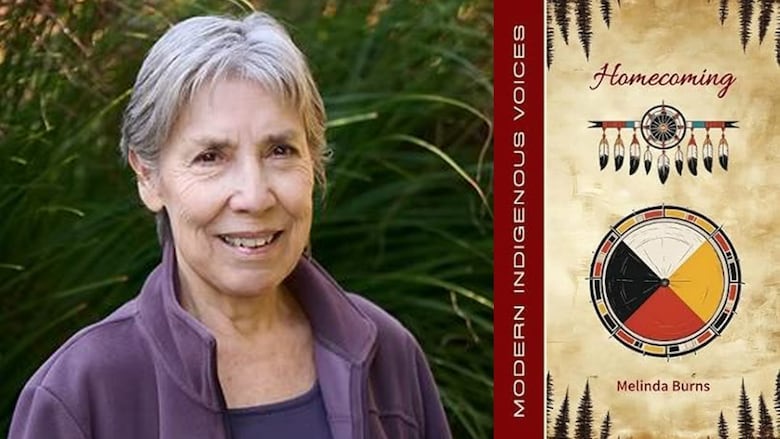Guelph author Melinda Burns uses poetry to connect to her Indigenous roots
Homecoming is about 'the journey that all of us make to come home to ourselves'

The medicine wheel is a sacred symbol in many Indigenous cultures. It represents the four seasons and how each is associated with different aspects of life, growth and teachings.
For Guelph author Melinda Burns, it served as a way for her to reclaim and celebrate her heritage. And she does this through a collection of poetry found in her recently released book Homecoming.
Her poems are grouped according to the directions found on the medicine wheel. Each section reflects both the universal human journey of growth and learning, and the author's personal experiences.
Burns recently sat down with CBC K-W's The Morning Edition host Craig Norris to talk more about the book.
The following interview has been edited for length and clarity.
Audio of the interview can be found at the bottom of this article.
Craig Norris: The poems you wrote represent the four directions of the medicine wheel. For those who aren't familiar with what each direction means, could you walk us through them?
Melinda Burns: It's a symbol in Native American spirituality of wholeness and balance, and it's a circle that's divided into four quadrants. The east is for beginnings, spring, morning, starting out. The south is for summer and the afternoon adolescence of life. And that represents innocence and joy. The west is autumn and evening, and it has to do with loss, but also introspection. And then the north is for winter and for the ancestors and old age. And it has to do with wisdom.
Norris: How does your poetry correlate with the wheel?
Burns: When I was starting to put this collection together, I was trying to think of how to order the poems that I've written over a long time. So there were poems for my childhood and growing up and my relationship with my mother, marriage, motherhood. And when I thought of doing it chronologically, it just didn't seem quite right. And when I hit on the idea of arranging them according to the medicine wheel, it really presented a sense of wholeness in a life. In the east there are many beginnings, not just the beginning of our life. And in the south there are many joys, not just the joys and wonder of childhood. And of course many losses and the need to go within to understand them. And also a lot of gathering of wisdom over the years as we live and as we connect with our ancestors.
Norris: As you've been writing and compiling these poems, what has that done for you personally, as you continue your own journey of reclaiming your heritage?
Burns: Well, it is an ongoing journey. I called the book Homecoming from the very beginning because it's about the journey that all of us make to come home to ourselves, to who we're meant to be and who we really are. So there was a double impact for me. One was just compiling the poems and getting to see my life [and having] that feeling of wholeness, that everything fits, that nothing is good or bad or right or wrong, it is just part of the cycle. But the other part certainly was about putting it out as a native person claiming this very rich heritage that I didn't get to know about from my mother because of her connection to residential schools and her distancing from our heritage.
Norris: What has your poetry helped you to learn about yourself?
Burns: I really do think poetry helps us learn a great deal about ourselves. There's a quote from Rumi at the beginning of the book that says: 'Through love, all pain will turn to medicine.' And I think it's helped me to see how true that is, that when we, when I approach my life with love, with everything that's happened in it, the highs and lows, the joys and losses, that it does turn to medicine and in the sense that it strengthens and fortifies me.
Norris: Could you share a poem with us?
Burns: I have one that I wrote some years ago, and you might recognize this particular festival this is referring to...
LISTEN | Melinda Burns' reading of Hillside Festival here.
Norris: What do you hope people take away from your collection of poetry?
Burns: I hope that they can relate to each section as they read it. So there's four sections and then the centre, which is the place of mystery and the creator. And that as they read my poems in those sections, they think about their own beginnings and their own joys and their own losses and times of going within and their own wisdom that they've acquired. And that it helps them to see their lives in this sense of wholeness rather than that linear idea of birth on the left and death on the right and trying to get somewhere in between. That there's really no place we need to get. We're just always circling the mystery. And I hope that's a comfort to people.
Norris: What's next for you?
Burns: A couple of things I'd love to mention. The French edition of the book is coming out in 2026, which is just amazing to me to be able to see my poems in another language. I'll be reading at the Eden Mills Writers' Festival this year. It's on Sept, 7 and right now the The Hillside Festival poem is in a poetry and art rotating exhibit at The Boathouse in Guelph, and the exhibit is going to feature poems and artwork that is inspired by the poems [in Homecoming].
LISTEN | Guelph author reclaims her heritage through poetry:
